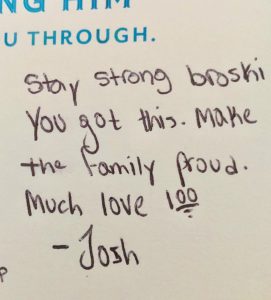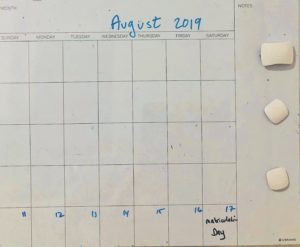On the first day of their senior year of high school, it begins. Your child leaves for school, maybe indulging you in one last photo before walking across the lawn, past the long-outgrown swing set, and into the car. You’re surprised by the powerful loss that accompanies the pride you feel, as you watch your high school senior walk away, and you kind of assume that the feelings will end there. But then you log onto Facebook, and there it is: a newsfeed full of “last first day of school” photos, and as you scroll through them, you realize that this is just the beginning of the process of letting go.
I recently dropped my son off at a military college, and my experience had me thinking about how our culture doesn’t support the transition from high school to college. Leaving home for the first time is supposed to be a clean break—like ripping off a band aid—both for parents and children. But parents who arrive home to an empty nest feeling anything other than the desire to immediately remodel their child’s bedroom often find that their emotions are dismissed by others. (I chuckled when a colonel at my son’s school said to me, “Now you can turn your son’s bedroom into a sewing room!”)
Excitement over your new freedom seems to be the only socially acceptable reaction when your child leaves the nest. Sadness—on the other hand—is often perceived as a strange response to a milestone that should be making us happy! Since we don’t have much vocabulary for expressing grief in our culture no matter what the situation, this can be an especially lonely time. While I can’t say I have it completely figured out, here are my five tips on how to navigate this bittersweet transition:
1. The process begins the first day of senior year.
Those twinges that you feel as your child leaves for his last first day of high school? They are a signal that it is time to start preparing yourself for the separation. If you push these feelings aside until the night before freshman year, you are more likely to be blindsided by them. That pit in your stomach? That is your love. This big, happy, often challenging chapter of child-rearing as you know it is almost over. It is helpful to start processing these feelings earlier rather than later.
2. Create rituals.
Even in the chaos of packing and list-making, I encouraged my son to make a wish list of things he wanted to do as a family during his last month at home. We went on trips, visiting friends and family. I cooked his favorite meals and we ate at his favorite restaurants. I also compiled a book of photos and notes from the cherished people in his life.
The experience of making a keepsake album for my son, one that could root him in memories at any time, was very comforting for us all. It was also a tribute to our beloved community, that stands by and supports him with much love.
I encourage everyone to share a ritual with your college-bound teen, one that is especially meaningful for your family. A video of my son’s friend, Daniel, exchanging a special parting handshake with his mom on college drop-off day, went viral, and for good reason. The powerful connection between them and the raw emotion of those last few moments together reflects what many families are truly experiencing.
3. Feel your feelings.
The bond between a parent and a child is a gift, so it makes sense that the separation will be hard. That is to say: it is normal to be sad! Allow yourself to grieve, and surround yourself with people who validate your feelings rather than discount them. After my son left, I realized that eighteen years of going to church with him were gone in a flash. I hadn’t expected Mass to make me emotional, and I wasn’t the only one: a friend of mine also started crying in church, two weeks before her son even left. We can’t always predict when we will be overwhelmed by our feelings, and that’s okay. In addition, give some thought to how you might feel right after the “goodbye.” Try to anticipate what will make for a softer landing.
I find it helpful to always keep a sense of humor. One piece of advice from a friend really made me laugh. She texted me: “The grief is going to continue. I remember when I dropped Rosie off at college I was sobbing so loudly in public. And then I went to 7-Eleven and got a pack of cigarettes, two pints of ice cream and some popcorn and did some serious damage on all of the above. It was awesome and tragic.”
4. Expect the unexpected.
I was surprised by the moments that stirred up the most feelings, circumstances that I never could have predicted would make me emotional. Returning from dropping my son off at college and finding the clothes that he left behind in the dryer, not having to discuss music choices in the car…seeing that our family calendar, which used to be completely full, now had only one date: August 17th: Matriculation Day. There is really no way to plan ahead for these feelings, except to remember that the strength of your own emotions is a testament to the bond and rich life you created with your child.
5. Practice self-care.
Be super gentle with yourself.
The day I dropped my son off at college was also my birthday. I usually have a party in New York, but this year, I decided not to celebrate in favor of quiet time when I got home. Sometimes, taking care of yourself means being still with yourself. The day after my birthday, I had some of my son’s friends from the football team over with their moms, and we wrote a group letter to him and prayed for his safety through initiation “Hell Week.” It was a sweet celebration, made better by the fact that I had followed my instincts the day before.
So, families, here is what I’ve got for you: Feel all your feelings as it will help you move through the process at a faster pace, be real with others and you might find new connections and support. Take care of yourself and don’t lose your sense of humor. Try to keep in mind that this is the human experience, and part of the privilege of being a parent is seeing your relationship with your children evolve as they move into young adulthood. And if you have already transformed your child’s bedroom into a sewing room, that’s great too. We all navigate these milestones in our individual ways. Whatever your experience is….you got this!
P.S. Want more information on emotional intelligence?
The benefits to feeling your feelings are endorsed by science. One of my favorite quotes from Dr. Marc Brackett, Director of the Yale Center of Emotional Intelligence, is: “Name it to tame it.” He has some excellent advice on the benefits of emotional intelligence in his new book, Permission to Feel.










